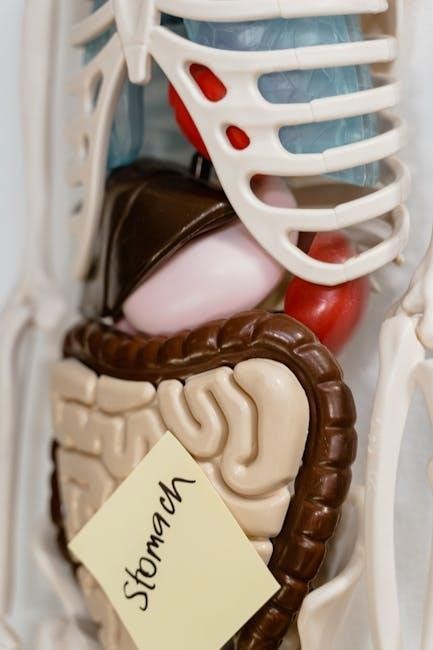Welcome to the HESI Med Surg Study Guide, a comprehensive resource designed to help nursing students and professionals master medical-surgical nursing concepts. This guide provides a structured approach to understanding key topics, from cardiovascular care to renal disorders, ensuring a strong foundation for clinical success. Through detailed explanations, practice questions, and evidence-based strategies, it equips learners with the critical thinking and prioritization skills essential for excelling in med-surg nursing. Whether you’re preparing for exams, refining your clinical skills, or seeking to enhance your knowledge, this guide offers a clear path to achieving your goals.

1.1 Overview of the HESI Med Surg Exam
The HESI Med Surg Exam is a comprehensive assessment designed to evaluate a nurse’s knowledge and critical thinking skills in medical-surgical nursing. It focuses on key areas such as cardiovascular, respiratory, gastrointestinal, and renal systems, ensuring a thorough understanding of pathophysiology, pharmacology, and nursing interventions. The exam includes multiple-choice questions that test prioritization, patient outcomes, and evidence-based practices. Candidates must demonstrate the ability to analyze complex clinical scenarios, making it essential to master both content and test-taking strategies. With a mix of straightforward and intricate questions, the exam challenges even experienced nurses, emphasizing the need for thorough preparation and practice. Time management and question analysis are critical to achieving success.
1.2 Importance of Preparation
Preparation is crucial for success on the HESI Med Surg Exam, as it assesses both knowledge and critical thinking skills. Thorough study ensures nurses can apply their understanding of complex clinical scenarios effectively. Without proper preparation, even experienced professionals may struggle with the exam’s challenging questions. Effective preparation involves using study guides, flashcards, and practice exams to master content and improve test-taking strategies. Creating a structured study schedule and seeking support from peers or tutors can also enhance readiness. Adequate preparation builds confidence, reduces exam anxiety, and ensures nurses are well-equipped to provide high-quality patient care. It is essential to allocate sufficient time to review and practice, ensuring a strong foundation in all key areas.

Key Subject Areas Covered in HESI Med Surg
The HESI Med Surg exam covers essential areas such as cardiovascular, respiratory, gastrointestinal, and renal systems. It also includes oncology, neurological care, and musculoskeletal disorders. The test evaluates patient assessment skills, nursing interventions, and pharmacological treatments, ensuring comprehensive clinical competence.
2.1 Cardiovascular Care
Cardiovascular care is a critical component of the HESI Med Surg exam, focusing on the assessment and management of conditions like myocardial infarction, heart failure, and arrhythmias. Key topics include interpreting ECGs, understanding cardiac medications such as statins and beta-blockers, and prioritizing interventions like oxygen therapy and pain management. Nursing strategies for acute coronary syndromes, including recognizing signs of cardiac ischemia and implementing emergency protocols, are emphasized. Additionally, the section covers post-cardiac surgery care, including monitoring for complications and educating patients on lifestyle modifications to reduce cardiac risk factors. Effective prioritization and critical thinking are essential for managing complex cardiovascular scenarios, making this a high-focus area for exam preparation.
2.2 Respiratory Care
Respiratory care is a fundamental aspect of medical-surgical nursing, focusing on the assessment and management of pulmonary conditions such as chronic obstructive pulmonary disease (COPD), pneumonia, and acute respiratory distress syndrome (ARDS). Key topics include interpreting arterial blood gases (ABGs), understanding oxygen therapy modalities, and managing patients on mechanical ventilation. Nurses must prioritize interventions like ensuring patent airways, administering bronchodilators, and monitoring for signs of respiratory failure. Effective assessment skills, such as auscultating lung sounds and evaluating respiratory patterns, are crucial for identifying complications early. This section emphasizes the importance of evidence-based practices in promoting lung health and improving patient outcomes in both acute and chronic respiratory scenarios.
2.3 Gastrointestinal Care
Gastrointestinal (GI) care focuses on managing conditions affecting the digestive system, such as gastroesophageal reflux disease (GERD), peptic ulcers, inflammatory bowel disease (IBD), and liver disorders. Nurses must assess for symptoms like abdominal pain, nausea, and changes in bowel habits. Key interventions include administering medications like antacids, histamine-2 receptor antagonists, and proton pump inhibitors to manage acid-related disorders. Additionally, dietary modifications, such as a low-acid or high-fiber diet, are essential. Monitoring for complications like GI bleeding or perforation is critical. Understanding laboratory tests, such as liver function tests, and imaging studies helps guide care. Effective GI care also involves educating patients on lifestyle changes and medication adherence to promote healing and prevent recurrence.
2.4 Renal and Genitourinary Care
Renal and genitourinary care focuses on managing conditions affecting the kidneys, bladder, and urinary tract. Key topics include acute kidney injury (AKI), chronic kidney disease (CKD), and urinary tract infections (UTIs). Nurses must assess for symptoms like hematuria, dysuria, and changes in urine output. Interventions include fluid management, electrolyte balance, and administering medications like diuretics or antibiotics. Monitoring renal function tests and urinary analysis is essential. Patients with CKD require education on dietary restrictions, such as low-protein and low-sodium diets. Additionally, addressing complications like hypertension and edema is critical. Understanding surgical interventions, such as nephrectomy or catheterization, and post-operative care is also vital. Effective care ensures optimal renal function and prevents progression of disease.

Effective Study Resources for HESI Med Surg
Effective study resources for HESI Med Surg include textbooks, online guides, and flashcards; Utilize reputable textbooks like Fundamentals of Medical-Surgical Nursing for in-depth knowledge. Online platforms offer interactive study guides and practice questions, while flashcards aid in memorizing key terms and concepts. These tools enhance understanding and retention, ensuring exam success.
3.1 Recommended Textbooks
Several textbooks are highly recommended for HESI Med Surg preparation. Fundamentals of Medical-Surgical Nursing by Lewis, Dirksen, and Heitkemper is a comprehensive resource, offering detailed explanations of medical conditions and nursing interventions. Medical-Surgical Nursing: Assessment and Management of Clinical Problems by Ignatavicius and Workman is another excellent choice, providing evidence-based practices and case studies. Additionally, HESI Med Surg Notes is a concise study guide tailored for exam preparation, featuring practice questions and key concepts. These textbooks complement online resources, ensuring a well-rounded study approach for success on the HESI Med Surg exam.
3.2 Online Study Guides and Flashcards
Online study guides and flashcards are invaluable tools for HESI Med Surg preparation. Platforms like Quizlet offer extensive flashcard decks covering key terms and concepts, such as cardiovascular care and respiratory conditions. HESI-specific practice questions are also available online, mirroring the exam format and helping students assess their readiness. Additionally, interactive study guides provide in-depth explanations and case studies, enhancing critical thinking skills. Many resources include progress-tracking features, allowing learners to identify weak areas and focus their study efforts. These digital tools are accessible anytime, making them ideal for flexible learning. Utilizing these resources alongside traditional study methods ensures a well-rounded and effective preparation strategy for the HESI Med Surg exam.

Test-Taking Strategies for Success
Mastering test-taking strategies is crucial for HESI Med Surg success. Focus on critical thinking, time management, and question analysis. Prioritize tasks, eliminate distractors, and select the best answers confidently.
4.1 Critical Thinking and Prioritization
Critical thinking and prioritization are essential skills for success on the HESI Med Surg exam. These skills enable nurses to quickly assess patient needs, identify the most critical issues, and make sound decisions. By focusing on prioritization, nurses can effectively manage multiple tasks and ensure patient safety. Regular practice with realistic scenarios helps reinforce these skills, making them second nature during high-pressure situations. Mastering these strategies not only improves exam performance but also enhances clinical competence, ensuring better patient outcomes.
4.2 Time Management During the Exam
Effective time management is crucial for success on the HESI Med Surg exam. Allocate a set amount of time to each question to avoid spending too long on a single item. Practice with timed simulations to build familiarity with the exam format and improve pacing. Prioritize answering questions you’re confident about first, then return to challenging ones. Use the process of elimination to narrow down answer choices when unsure. Avoid getting stuck on one question, as this can negatively impact your overall score. By managing your time wisely, you can efficiently complete the exam and demonstrate your full knowledge and skills. This strategy enhances your ability to perform under pressure and achieve a higher score.
4.3 Analyzing Question Types
HESI Med Surg questions are designed to test critical thinking and clinical reasoning. Common question types include multiple-choice, prioritization scenarios, and case studies. Many questions focus on identifying the most appropriate nursing action, requiring analysis of symptoms, lab results, and patient history. Prioritization questions often involve applying the ABCs (Airway, Breathing, Circulation) or Maslow’s Hierarchy of Needs. Understanding the question stem and identifying key terms like “priority,” “immediate,” or “most likely” can guide your answer. Distractors are included to test knowledge of less critical actions. Practice identifying these patterns and focus on the most relevant information. This skill enhances your ability to approach questions systematically and select the correct answer efficiently during the exam.

Practice Questions and Case Studies
Practice questions and case studies simulate real clinical scenarios, helping students apply knowledge and improve critical thinking and prioritization skills for the HESI Med Surg exam.
5.1 Sample Questions and Answers
Sample questions and answers provide real exam-like scenarios, helping students assess their understanding. For example, Question: “A client with chest pain is diagnosed with a myocardial infarction. What is the priority nursing action?” Answer: “Administer oxygen via nasal cannula.” Rationale: Oxygen improves cardiac tissue oxygenation. Another example: Question: “A client with dehydration receives IV normal saline at 125 mL/hr. One hour later, they report, ‘I can’t breathe!'” Answer: “Assess respiratory status and notify the physician.” Rationale: Rapid infusion may cause fluid overload. These samples enhance critical thinking and prioritization skills, mirroring the exam format. Regular practice with such questions ensures readiness for the HESI Med Surg exam, improving confidence and competence in clinical decision-making.
5.2 Common Exam Scenarios
Common exam scenarios simulate real-life clinical situations, helping students apply knowledge effectively. For instance, a client with chest pain may require prioritizing oxygen therapy. Another scenario involves a dehydrated client receiving IV fluids, where the nurse must monitor for fluid overload. These situations test critical thinking and prioritization skills, reflecting actual patient care challenges. Additionally, scenarios may include clients with respiratory distress or gastrointestinal issues, requiring immediate interventions. These practice questions mirror the exam format, ensuring students are well-prepared for diverse clinical cases. Regular exposure to these scenarios enhances decision-making abilities, boosting confidence and readiness for the HESI Med Surg exam. Mastery of these scenarios is crucial for achieving success.

Additional Tips for Exam Preparation
Create a study schedule, utilize flashcards, and seek peer support. Prioritize understanding concepts over memorization and practice critical thinking with real-life clinical scenarios. Stay organized and focused.
6.1 Creating a Study Schedule
Creating a structured study schedule is essential for effective exam preparation. Start by breaking down your study material into manageable weekly and daily goals. Allocate specific time blocks for each topic, ensuring a balanced focus on both strong and weak areas; Use a planner, calendar, or digital app to stay organized and track progress. Prioritize challenging subjects during your most productive hours and incorporate regular breaks to maintain focus. Dedicate time for practice questions and case studies to apply theoretical knowledge. Consistency is key; stick to your schedule but remain flexible to accommodate unexpected tasks. Regular review sessions will reinforce learning and reduce exam anxiety. A well-organized study plan fosters discipline and maximizes retention, leading to improved performance on the HESI Med Surg exam.
6.2 Utilizing Flashcards for Memorization
Flashcards are a powerful tool for memorizing key terms, concepts, and procedures in medical-surgical nursing. Create physical or digital flashcards with terms on one side and definitions or explanations on the other. Focus on high-yield topics like medications, lab values, and common conditions. Use flashcards to reinforce memory by reviewing them regularly, especially before exams. Carry flashcards with you for quick study sessions or use apps like Quizlet for convenience. Group similar cards together to organize your study sessions effectively. Test yourself by covering the answer side to actively recall information. Consistent use of flashcards will help solidify your understanding and improve retention, making them an essential part of your HESI Med Surg preparation.
6.3 Seeking Support from Peers or Tutors
Seeking support from peers or tutors is a highly effective way to strengthen your understanding of medical-surgical nursing concepts. Collaborating with classmates allows for shared knowledge and diverse perspectives, helping to clarify complex topics. Tutors, on the other hand, provide one-on-one guidance, addressing specific areas of difficulty. Engage in study groups to discuss challenging subjects, such as pharmacology or pathophysiology. Peers can offer insights and tips, while tutors can break down difficult concepts into simpler terms. Don’t hesitate to ask questions or seek clarification on areas you’re struggling with. Active discussion and problem-solving with others can enhance your critical thinking skills and confidence. Building a support network will not only improve your academic performance but also reduce stress during exam preparation.



